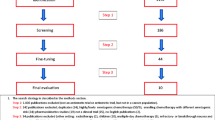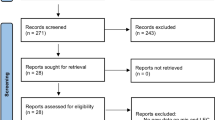Abstract
Data on the incidence and efficacy of antiemetic prophylaxis against delayed emesis induced by moderately emetogenic chemotherapy are scanty. An overview of the literature has been done that showed the efficacy of dexamethasone in two of three randomized trials. Its optimal dose and duration of administration has not been defined. Only one of four randomized studies showed a statistically significant efficacy of 5-HT3 antagonists. Finally, only weak evidence has been published on the efficacy of dopamine receptor antagonists.
Similar content being viewed by others
References
Antiemetic Subcommittee of the Multinational Association of Supportive Care in Cancer (MASCC) (1998) Prevention of chemotherapy- and radiotherapy-induced emesis: results of the Perugia Consensus Conference. Ann Oncol 9:811–819
ASHP Commission on Therapeutics (1999) ASHP therapeutic guidelines on the pharmacologic management of nausea and vomiting in adult and pediatric patients receiving chemotherapy or radiation therapy or undergoing surgery. Am J Health-Syst Pharm 56:729–764
Barrenetxea G, Schneider J, Centeno MM, et al (1996) Chemotherapy-induced emesis: management of early and delayed emesis in milder emetogenic regimens. Cancer Chemother Pharmacol 38:471–475
De Angelis V, Roila F, Sabbatini R, et al (2003) Cancer chemotherapy-induced delayed emesis: antiemetic prescriptions in clinical practice. Proc ASCO 22:739
Eisenberg P, Figueroa-Vadillo J, Zamora R, et al (2003) Improved prevention of moderately emetogenic chemotherapy-induced nausea and vomiting with palonosetron, a pharmacologically novel 5-HT3 receptor antagonist. Cancer 98:2473–2482
ESMO Guidelines Task Force (2001). ESMO recommendations for prophylaxis of chemotherapy-induced nausea and vomiting. Ann Oncol 12:1059–1060
Esseboom EU, Rojer RA, Borm JJ, et al (1995) Prophylaxis of delayed nausea and vomiting after cancer chemotherapy. Neth J Med 47:12–17
Gralla RJ, Osoba D, Kris MG, et al (1999) Recommendations for the use of antiemetics: evidence-based, clinical practice guidelines. J Clin Oncol 17:2971–2994
Gralla R, Lichinitser M, Van der Vegt S, et al (2003) Palonosetron improves prevention of chemotherapy-induced nausea and vomiting following moderately emetogenic chemotherapy: results of a double-blind randomized phase III trial comparing single doses of palonosetron with ondansetron. Ann Oncol 14:1570–1577
Grunberg SM, Hansen M, Deuson R, et al (2002) Incidence and impact of nausea and vomiting with modern antiemetics: perception versus reality. Proc. ASCO 21:250a
Herrstedt J, Sigsgaard T, Boesgaard M, et al (1993) Ondansetron plus metopimazine compared with ondansetron alone in patients receiving moderately emetogenic chemotherapy. New Engl J Med 328:1076–1080
Inoue A, Yamada Y, Matsumura Y, et al (2003) Randomized study of dexamethasone treatment for delayed emesis, anorexia and fatigue induced by irinotecan. Support Care Cancer 11:528–532
Italian Group for Antiemetic Research (1997) Delayed emesis induced by moderately emetogenic chemotherapy: do we need to treat all patients? Ann Oncol 8:561–567
Italian Group for Antiemetic Research (1998) Transferability to clinical practice of the results of controlled clinical trials: the case of antiemetic prophylactic treatment for cancer chemotherapy-induced nausea and vomiting. Ann Oncol 9:759–765
Italian Group for Antiemetic Research (2000) Dexamethasone alone or in combination with ondansetron for the prevention of delayed nausea and vomiting induced by chemotherapy. N Engl J Med 342:1554–1559
Italian Group for Antiemetic Research (2004) Randomized, double-blind, dose-finding study of dexamethasone in preventing acute emesis induced by anthracyclines, carboplatin, or cyclophosphamide. J Clin Oncol 22:725–729
Italian Group for Antiemetic Research (2004) Transferring scientific evidence to oncological practice: a trial on the impact of three different implementation strategies on antiemetic prescriptions. Support Care Cancer 12(6):446–453
Kaizer L, Warr D, Hoskins P, et al (1994) Effect of schedule and maintenance on the antiemetic efficacy of ondansetron combined with dexamethasone in acute and delayed nausea and emesis in patients receiving moderately emetogenic chemotherapy: a phase III trial of the National Cancer Institute of Canada Clinical Trials Group. J Clin Oncol 12:1050–1057
Koo WH, Ang PT (1996) Role of maintenance oral dexamethasone in prophylaxis of delayed emesis caused by moderately emetogenic chemotherapy. Ann Oncol 7:71–74
Pater JL, Lofters WS, Zee B, et al (1997) The role of the 5-HT3 antagonists ondansetron and dolasetron in the control of delayed onset nausea and vomiting in patients receiving moderately emetogenic chemotherapy. Ann Oncol 8:181–185
Stewart A, McQuade B, Cronje JDE, et al (1995) Ondansetron compared with granisetron in the prophylaxis of cyclophosphamide induced emesis in outpatients: a multicentre, double-blind, double dummy, randomised, parallel group study. Oncology 52:202–210
Author information
Authors and Affiliations
Corresponding author
Rights and permissions
About this article
Cite this article
Roila, F., Warr, D., Clark-Snow, R.A. et al. Delayed emesis: moderately emetogenic chemotherapy. Support Care Cancer 13, 104–108 (2005). https://doi.org/10.1007/s00520-004-0700-8
Received:
Accepted:
Published:
Issue Date:
DOI: https://doi.org/10.1007/s00520-004-0700-8




